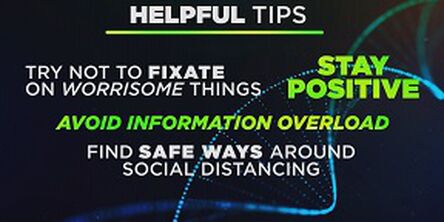 Are you noticing an increase in your anxiety during self distancing? Underlying anxiety which commonly dwells in our subconscious is usually muted by staying busy throughout the day and carrying out our normal tasks. This is our normal pattern of life which we are used to and expect. Recently with social distancing, our usual life pattern has been disrupted and replaced with isolating ourselves from others. The normal pattern of life has been replaced with the unknown. In our daily lives, we basically know what to expect from day to day and what the near future is going to be like. Recent events have made that unclear. The purpose of this blog entry is to gain further insight and perspective into how our normal underlying anxiety is increased by the changes created by social distancing, being isolated from others, and how our normal coping strategies have been altered. We are basically social people and we either enjoy or are required to interact with others. This interaction keeps our minds busy and provides a sense of belonging. This interaction allows us to have personal expression and interact with people in a familiar social environment we are used to. For most people, this social activity has been a constant behavior for several years. When we are required to abruptly cease this social behavior, a form of a crisis is created which causes the brain to figure out how to deal with this change is social interaction. The human brain also likes to know what to expect and does not enjoy uncertainty. Job loss, change in income, altered social interaction and fear of the unknown are just a few basic presumptions of what many are experiencing. Most of us have some form of anxiety in our subconscious which we do our best with to deal with every day. When we are busy, we are focusing on our every day lives which likely pushes our anxiety back into our subconscious. When we have no activity to distract us for extended periods of time, our subconscious is more likely to reveal unfinished business from our past. His can lead to an increase in dreams, irritability, increased anger and decreased ability to cope. Anxiety definition: Anxiety is the result of threats that appear to be uncontrollable or unavoidable. Anxiety is considered to be a normal reaction to stress. When faced with a situation we have not coped with before, our “fight or flight” response is activated, adrenaline is increased, heart rate rises, and our immune system is lowered to provide more energy to protect us from the perceived threat. Anxiety can also be described as uneasiness, apprehension, fear, or worry. F.E.A.R. False Evidence Appearing Real * Fear is related to escape and avoidance. * Fear occurs in the presence of an observed threat that is unfamiliar and the solution of the threat is unknown. * The threat can be physical or emotional. * When fear is not worked through, it remains in the subconscious and may manifest into anxiety. * When fear becomes excessive and dominates the consciousness, it can be anxiety. How the brain perceives fear, Have you have ever almost been in a car accident and experienced your body become tense, rapid heart rate, sweating and even dizziness? This response is involuntary and occurs because the brain perceives you are in imminent danger. Another example is if you have experienced fear while watching a horror movie. Although you are not in actual danger during the horror movie, the body and brain perceives fear the same. The primitive response part of the brain (hypothalamus) cannot tell the difference between actual reality and perceived reality and therefore cannot determine if you are in actual danger or perceived danger. The hypothalamus releases chemicals and can help to regulate the body’s temperature. The same psychological response may occur (rapid heart rate, sweating, tense muscles) because the hypothalamus perceives a threat. Your hypothalamus cannot tell the difference between actual danger and perceived danger, therefore a physiological response may occur from a memory that was once perceived as a threat. What can we do about anxiety? Mindfulness: Be aware of your physical responses to anxiety. Be aware of negative self talk. Write down both involuntary physical responses and negative self talk. Breathing: If we can interrupt the physiological response, we can effectively alter how we react to anxiety. Acknowledge the physical responses and practice relaxation techniques such as deep breathing. Slowly inhale through the nose for 8 seconds, hold your breath for 4 seconds, and slowly breathe out through the mouth for 8 seconds. Practice keeping the air as steady as possible when breathing out. Notice the tension on your shoulders, neck and face start to diminish. Negative self talk: Question the validity of the negative self talk. Are the negative things your saying about yourself actually true? What positive thoughts will you use to replace the negative thoughts. These negative thoughts serve no purpose and must be re-framed. Comments are closed.
|